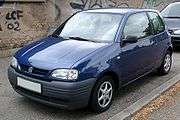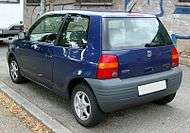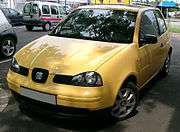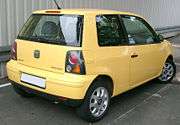SEAT Arosa
| SEAT Arosa | |
|---|---|
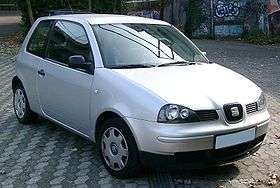 | |
| Overview | |
| Manufacturer | SEAT |
| Also called | Volkswagen Lupo |
| Production | 1997–2004[1] |
| Body and chassis | |
| Class | City car (A) |
| Body style | 3-door hatchback |
| Platform | Volkswagen Group A00 |
| Related | Volkswagen Lupo |
| Powertrain | |
| Engine |
1.0 L I4 1.4 L I4 1.4 L I4 16 valve 1.4 L I3 TDI 1.7 L I4 SDI |
| Dimensions | |
| Wheelbase | 2,323 mm (91.5 in) |
| Length | 3,551 mm (139.8 in) |
| Width | 1,639 mm (64.5 in) |
| Height | 1,460 mm (57 in) |
| Chronology | |
| Predecessor | SEAT Marbella |
| Successor | SEAT Mii |
The SEAT Arosa (Typ 6H) was a city car from the Spanish automaker SEAT, from 1997 to 2004. The model débuted in March 1998, at the Geneva Motor Show, while its facelifted version was presented in October 2000, at the Paris Motor Show. It shared the same platform with the Volkswagen Lupo.
The successor, SEAT Mii, was launched in October 21 2011, and has been on sale since January 15, 2012.
Pre-facelift (1997–2000)
Named after Villagarcía de Arosa, a municipality in the province of Pontevedra, Spain, it was only available as a three-door, four-seater hatchback. The Arosa, launched in 1998, was to a large extent identical to Volkswagen's own city car which was introduced later in 1998, Volkswagen Lupo, and both cars were based on the Volkswagen Group A00 platform, a shortened version of the A03 platform used by the larger Volkswagen Polo and SEAT Ibiza.
The Arosa was initially manufactured at a Volkswagen plant in Wolfsburg, Germany, and only in May 1998, was the production moved to SEAT facilities in Martorell in Spain.
The Arosa was designed by the same man who designed the Bugatti Veyron 16.4, Jozef Kabaň.
|
Facelift (2000–2004)
The model later received a facelift in October 2000. The Arosa replaced the SEAT Marbella in the Spanish brand's lineup, but itself was not replaced by any SEAT, when production ceased in June 2005. A successor eventually arrived in 2012 with the Mii.
Apart from its exterior restyling, the facelift model featured a restyled interior, with a new dashboard.
|
SEAT Arosa 3L
In 1999, SEAT presented the SEAT Arosa 3L to be launched in January 2000, a lightweight car fitted with a 61 PS (45 kW; 60 hp) 1.2 L TDI three-cylinder turbo diesel engine and consumption 2.99 litres per 100 kilometres (94 mpg-imp; 79 mpg-US). In order to reduce its fuel consumption, there has been an extensive use of aluminium and other light materials, cutting weight to 860 kilograms (1,900 lb), improvements in lowering the air resistance, Start-Stop modules and use of low-friction tires put into alloy wheels.
The model was also equipped with an electronically driven automatic transmission with three modes: 'Eco', Normal and 'Tiptronic'. This combination of powertrain and saving weight allowed the Arosa 3L to accelerate from zero to 100 km/h in 14.7 seconds, and reach a top speed of 164 km/h (102 mph).[2]
Engines
The Arosa was available with the following units:[3]
- 1.0 L (999 cc) I4, 8v OHC, 37 kW (50 PS), 86 N·m (63.4 ft·lbf)
- 1.4 L (1390 cc) I4, 8v OHC, 44 kW (60 PS), 116 N·m (85.6 ft·lbf)
- 1.4 L (1390 cc) I4, 16v DOHC, 74 kW (100 PS), 128 N·m (94.4 ft·lbf)
- 1.4 L (1422 cc) TDI I3, 6v OHC, 55 kW (75 PS), 195 N·m (143.8 ft·lbf)
- 1.7 L (1716 cc) SDI I4, 8v OHC, 44 kW (60 PS), 115 N·m (84.8 ft·lbf)
All engines came with a five-speed manual transmission, with a four-speed automatic optional on the 1.4 (44 kW).
Concept models

At the Frankfurt Motor Show in September 2001, SEAT presented two SEAT Arosa-based concept cars:
- the 'SEAT Arosa Racer'
- the 'SEAT Arosa City Cruiser'
Sales and production figures
Since its launch in 1997 up to 2005, more than 175,000 SEAT Arosa cars have been sold and produced.
The total production per year of SEAT Arosa cars, manufactured in SEAT and other Volkswagen group plants, is shown in the following table :
| model | 1997 | 1998 [4] | 1999 [4] | 2000 [5] | 2001 [6] | 2002 [7] | 2003 [8] | 2004 [9] |
|---|---|---|---|---|---|---|---|---|
| SEAT Arosa | ??? | 38,338 | 46,410 | 28,403 | 22,980 | 19,627 | 13,814 | 9,368 |
Awards
References
- ↑ "SEAT Arosa (1997 - 2005)". RAC. Retrieved 23 May 2015.
- ↑ Seat Arosa 3L http://www.spiegel.de/auto/fahrberichte/0,1518,47067,00.html
- ↑ "Global Autoindex". Retrieved 2007-02-17. (also the source for technical data in the infobox)
- 1 2 "Volkswagen AG Annual Report 1999" (PDF). Volkswagen AG. 2010-09-13. Retrieved 2010-09-13.
- ↑ Volkswagen AG Annual Report 2000 http://www.volkswagenag.com/vwag/vwcorp/info_center/en/publications/2001/03/Annual_Report_2000.-bin.acq/qual-BinaryStorageItem.Single.File/VW_GB_2000_e.pdf
- ↑ Volkswagen AG Annual Report 2001 http://www.volkswagenag.com/vwag/vwcorp/info_center/en/publications/2002/03/annual_report_2001.-bin.acq/qual-BinaryStorageItem.Single.File/20020312_GB_2001_e.pdf
- ↑ Volkswagen AG Annual Report 2002 http://www.volkswagenag.com/vwag/vwcorp/info_center/en/publications/2003/03/annual_report_2002.-bin.acq/qual-BinaryStorageItem.Single.File/vw_gb_2002_en.pdf
- ↑ Volkswagen AG Annual Report 2003 http://www.volkswagenag.com/vwag/vwcorp/info_center/en/publications/2004/03/annual_report_2003.-bin.acq/qual-BinaryStorageItem.Single.File/20040309_gb2003_e.pdf
- ↑ Volkswagen AG Annual Report 2004 http://www.volkswagenag.com/vwag/vwcorp/info_center/en/publications/2005/03/annual_report_2004.-bin.acq/qual-BinaryStorageItem.Single.File/Gbericht_2004_en.pdf
- ↑ "The new SEAT Ibiza wins the Golden Steering Wheel prize in Germany". Media.seat.com. Retrieved 2010-11-29.
- ↑ Palmares SEAT http://www.seat.pt/pt/generator/su/pt/SEAT/site/campanhas/DesportivoDoAno/main,lang=pt.html
External links
| Wikimedia Commons has media related to SEAT Arosa. |
| « previous — SEAT, a marque of the Volkswagen Group since 1986, car timeline, 1980s–present | ||||||||||||||||||||||||||||||||||||
|---|---|---|---|---|---|---|---|---|---|---|---|---|---|---|---|---|---|---|---|---|---|---|---|---|---|---|---|---|---|---|---|---|---|---|---|---|
| Type | 1980s | 1990s | 2000s | 2010s | ||||||||||||||||||||||||||||||||
| 0 | 1 | 2 | 3 | 4 | 5 | 6 | 7 | 8 | 9 | 0 | 1 | 2 | 3 | 4 | 5 | 6 | 7 | 8 | 9 | 0 | 1 | 2 | 3 | 4 | 5 | 6 | 7 | 8 | 9 | 0 | 1 | 2 | 3 | 4 | 5 | |
| City car | Panda | Marbella | Arosa | Mii | ||||||||||||||||||||||||||||||||
| Supermini | 127 | Ibiza I | Ibiza II | Ibiza III | Ibiza IV | |||||||||||||||||||||||||||||||
| Fura | Córdoba I | Córdoba II | ||||||||||||||||||||||||||||||||||
| Small family car | Ritmo | Ronda | León I | León II | León III | |||||||||||||||||||||||||||||||
| 131 | Málaga | Toledo I | Toledo II | Toledo III | Toledo IV | |||||||||||||||||||||||||||||||
| Large family car | 132 | Exeo | ||||||||||||||||||||||||||||||||||
| Compact MPV | Altea / Altea XL | |||||||||||||||||||||||||||||||||||
| Large MPV | Alhambra I | Alhambra II | ||||||||||||||||||||||||||||||||||
| Van | Trans | Terra | Inca | |||||||||||||||||||||||||||||||||
| ||||||||||||||||||||||||||||||||||||
